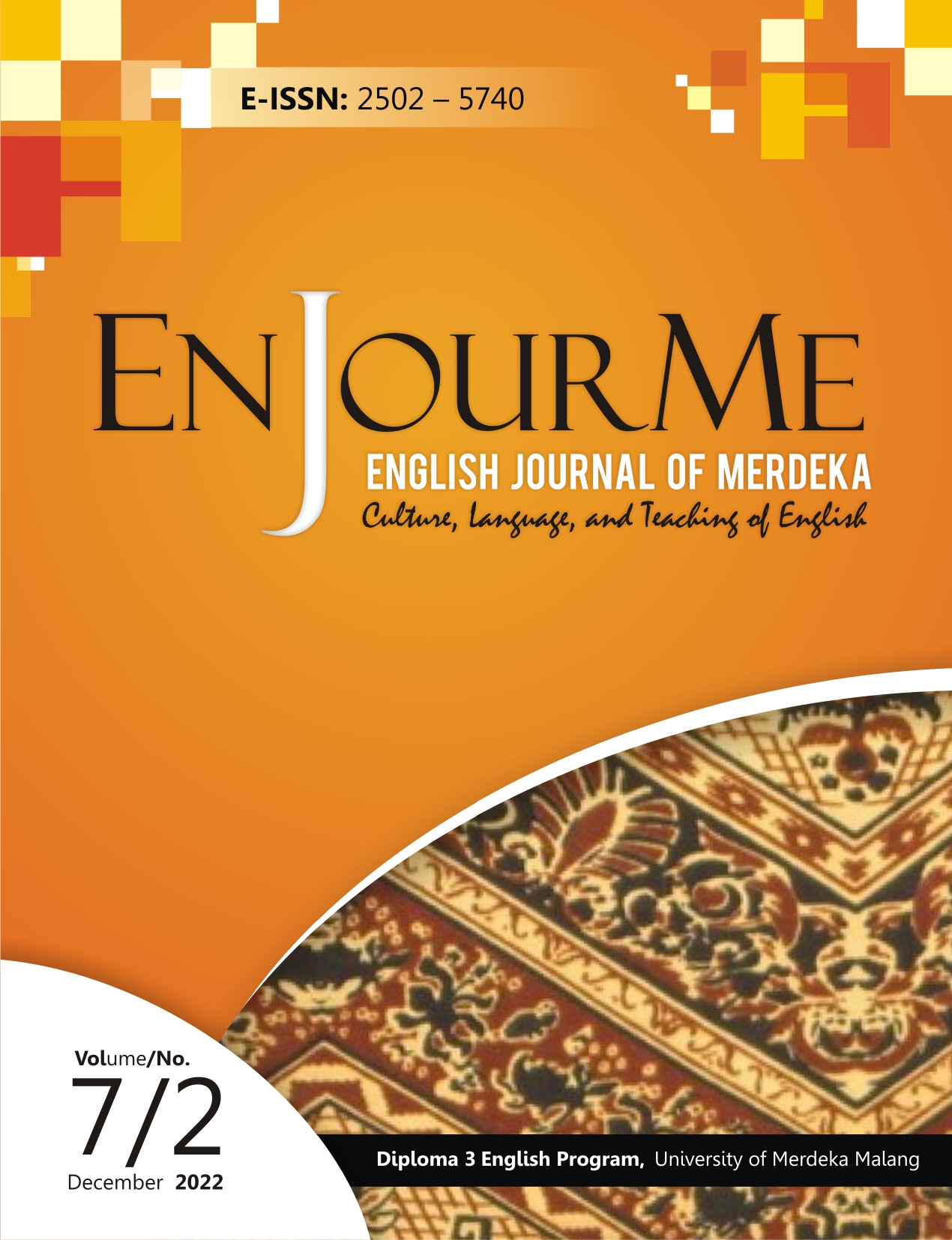Grammar phobia as a hindrance to the fluency in oral communication of Bangladeshi tertiary level students: A study
DOI:
https://doi.org/10.26905/enjourme.v7i2.8767Keywords:
Grammar, phobia, hindrance, fluency, oral communicationAbstract
Oral communication has a highly significant role to stay in touch with the current global circumstances, but a low level of speaking fluency is seemingly a major drawback for Bangladeshi tertiary-level students to achieve global standards of speaking. Taking the core issue into account, this study aims to explore grammar phobia as an obstacle to the learners’ way of gaining fluency in oral communication. To substantiate the hypothesis a fact-finding survey for the study has been conducted on the learners of the tertiary level of a particular region in Bangladesh. The findings of the study show grammar phobia of the learners as a major threat to fluency as they get less exposure to free expression and communication when it comes to mutual interaction in the classes. In a typical Bangladeshi approach to language learning, the learners are supposed to put extra emphasis on grammatical accuracy for communicative competence, but most of them admitted that they fumble in free fair communication for fear of grammatical issues. In addition, It would be further evident from the study that teachers’ limitations and lack of expertise contribute to the overall failure of tertiary-level learners in their performances in oral communication.
DOI:Â 10.26905/enjourme.v7i2.8767
Downloads
References
Abedin, M. M. (2012). The present mode of teaching in the ELT classes at the Higher Secondary level in Bangladesh: Is it the practice of CLT or disguised GTM? Retrieved from Bangladesh Journals Online: https://www.banglajol.info/index.php/SJE/article/view/14459/10267
Anastas, J. W. (1999). Flexible methods: Case study design. In J. W. Anastas, Research Design for Social Work and the Human Services. Columbia University Press.
Apuke, O. D. (2017). Quantitative research methods: A synopsis approach. Kuwait Chapter of Arabian Journal of Business and Management Review, 6(11), 40-47. https://doi.org/10.12816/0040336
Basak, A. (2014). English Language Teaching and Learning in Bangladesh: CLT perspective. IOSR Jornal Of Humanities And Social Science, 19(12), 9-13. Retrieved from https://www.iosrjournals.org/
Bosu, A. (2020). Present status of Teaching & Learning of English in Bangladesh and feasible solution. Dainik Ocean. Retrieved from https://www.dainikocean.com/en/
Desfitranita, D. (2017). Students' Rules and Practices: How to Speak English Fluently? Al-T'ALIM JOURNAL, 24(1), 19-28. https://doi.org/10.15548/jt.v24i1.253/
Hasnaine, I. (2020). Learning English: Are we overphasising? The Financial Express. Retrieved from https://thefinancialexpress.com.bd/views/learning-english-are-we-
Idrus, H., & Salleh, H. I. (2007). Perceived self-efficacy of Malaysian ESL Engineering and Technology students on their speaking ability and its pedagogical implications. The English Teacher, 37, 61-75.
Islam, W. A. (1997). Should English Grammar be taught in Bangladesh? Journal of the Institute of Modern Language, 1(1), 24-25.
Jackson, R., Drummond, D. K., & Camara, S. (2007). What is qualitative research? Qualitative Research Reports in Communication, 8(1), 21-28. https://doi.org/10.1080/17459430701617879
Mridha, M. M., & Muniruzzaman, S. M. (2020). Developing Speaking skill: Barriers faced by the Bangladeshi EFL Learners. Englisia: Journal of Language, Education, and Humanities, 7(2), 116-131. https://doi.org/10.22373/ej.v7i2.6257
Naik, P. R. (2018). The importance of learning English in Bangladesh. The Daily Star.
Pienemann, M.(1984). Psychological constraints on the teachability of languages. In Studies in Second Language Acquisition (pp. 186-214). Cambridge University Press. https://doi.org/10.1017/S0272263100005015
Polishchuk, O. (2017). Communication barriers faced by English Language Learners at a University Level: Factors and Solutions. Science and Education, 44-48.
Rádlová, S., Polák, J., Janovcová, M., SedláÄková, K., Peléšková, Å ., Landová, E., & Frynta, D. (2020). Emotional reaction to fear- and disgust-evoking snakes: Sensitivity and propensity in snake-fearful respondents. Frontiers. https://doi.org/10.3389/fpsyg.2020.00031
Rahman, T. (2018). Anomalies in english learning of Bangladeshi 8th grade learners. European Journal of Language Studies, 5(1). Retrieved from https://www.idpublications.org
Rahmotullah, M. (2020). Teaching Grammar at the higher secondary level in Bangladesh: A study of the problems and possible solutions. Research Journal of English Language and Literature, 8(1). https://doi.org/10.33329/rjelal.8.1.450sa
Schütz, R. E. (1998). Stephen Krashen's theory of Second Language Acquisition. Retrieved from English Made in Brazil: https://www.sk.com.br/sk-krash-english.html
Siddiqua, A. (2016). Challenges of Teaching English Vocabulary at the Higher Secondary Level in Bangladesh. The Journal of EFL Education and Research, 1(1).
Stevick, E. W. (1976). Memory, meaning, and method: Some psychological perspectives on language learning. Newbury House.
Sultana, N., & Jamin, B. (2021). Overcoming Fear to Improve English Speaking Skill. International Journal of Research and innovation in Social Science, 5(12).
Tanveer, M. (2008). Investigation of the factors that cause language anxiety for ESL?EFL learners in learning speaking skills and the influence it casts on communication in the target language. https://doi.org/10.13140/RG.2.1.1995.1129
Tashakkori, A., & Creswell, J. W. (2007). Editorial: The new era of mixed methods. Journal of Mixed Methods Research, 1(1), 3-7. https://doi.org/10.1177/2345678906293042
Wright, S., O'Brien B., C., Nimmon, L., Law, M., & Mylopoulos, M., (2016). Research design considerations. J Grad Med Educ 8 (1), 97– 98. https://doi.org/10.4300/JGME-D-15-00566.1
Additional Files
Published
How to Cite
Issue
Section
License
Authors who publish with this journal agree to the following terms:
(1) Copyright of the published articles will be transferred to the journal as the publisher of the manuscripts. Therefore, the author confirms that the copyright has been managed by the journal.
(2) Publisher of EnJourMe (English Journal of Merdeka) : Culture, Language, and Teaching of English is University of Merdeka Malang.
(3) The copyright follows Creative Commons Attribution–ShareAlike License (CC BY SA): This license allows to Share — copy and redistribute the material in any medium or format, Adapt — remix, transform, and build upon the material, for any purpose, even commercially.




